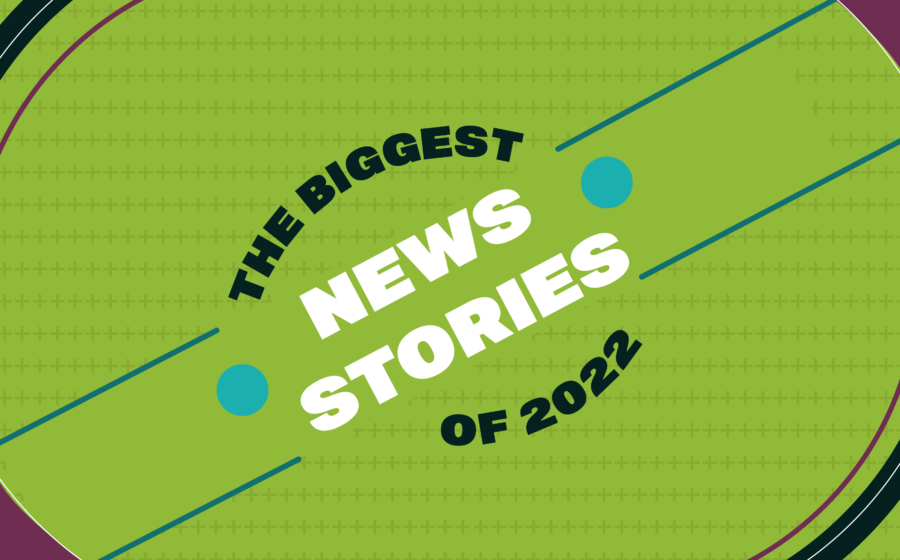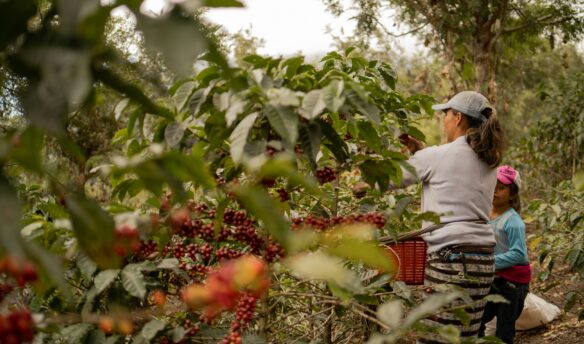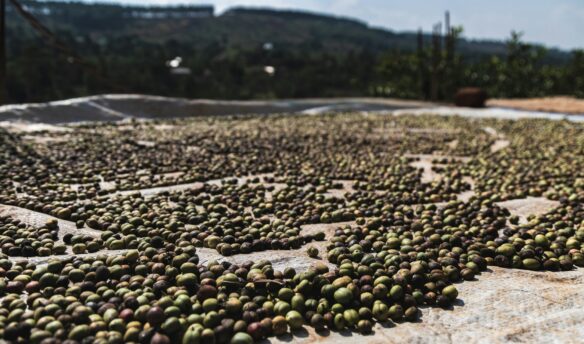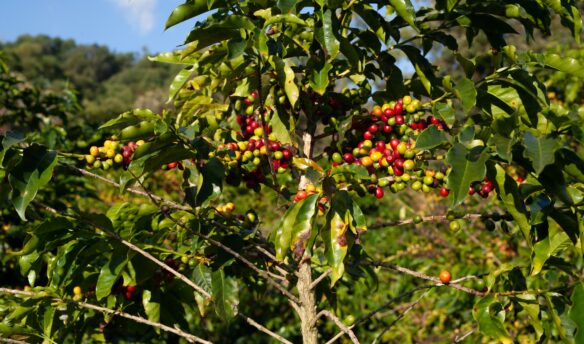Global geopolitics, a surging coffee labor movement, and a whole lot of greenwashing: welcome to the Fresh Cup 2022 Year in Review.
War, Inflation, NFTs, and a Plummeting C Price: The Year in Coffee
2022 had it all: a war of aggression by a global superpower; rampant inflation across much of the world; a cost of living crisis that seems to have affected almost every country; and we all had to learn what the word “fungible” means.
Coffee was inextricably bound up in all of that, as it is in most things. Russia’s invasion of Ukraine in February caused major chains to exit the country. Starbucks closed 130 stores, which were promptly bought and reopened under the don’t-confuse-us-with-Starbucks Stars Coffee brand. The sanctions placed on Russia caused many downstream problems for the coffee industry, with the cost of fertilizer skyrocketing and the World of Coffee being moved from Warsaw to Milan.
The war in Ukraine also added to already increasing inflation, which led to coffee companies (and everyone else) raising prices. Many big companies did this despite record earnings—Starbucks, JDE Peet’s, and Nestlé all reported staggering profits but blamed inflation for rising prices.
Many questioned whether consumers might stop visiting cafes as inflation and cost of living expenses made 2022 difficult for everyone (except, of course, the executives reporting
record-breaking profits). The head of the International Coffee Organization (ICO) mused that “people are going to lower the quality of what they drink and change where they drink it.” Although we never got any definitive proof that this happened, foot traffic to coffee shops did fall, and Starbucks did consider selling its UK operations.
In competition news, Morgan Eckroth won the US Barista Championship in April, livestreaming the whole thing to their millions of followers on TikTok and YouTube. At the World Championship in Melbourne, Eckroth placed second to Aussie Anthony Douglas, who won the event on home turf. The World Brewers Cup was won by Taiwan’s Shih Yuan Hsu (Sherry).
Although not the first coffee company to experiment with non-fungible tokens (NFTs), Starbucks went all-in on the gimmicky blockchain-based digital tokens with a plan to use them as the basis of a loyalty platform. Coincidentally, the beta launch of Starbucks Odyssey overlapped with a series of cryptocurrency meltdowns, while the trading volume of NFTs fell 97% from January to September.
Back in the real world, the commodity coffee price fell after beginning the year at its highest point in a decade. This high was a result of, among other things, forecasters predicted a low coffee supply after a season of bad weather in Brazil. It’s amazing how much sway one country has over worldwide prices, because when more bullish reports of Brazil’s 2023 harvest began trickling out, the C price plummeted. Eventually, predictions tempered out somewhat, and the price climbed back up—but only slightly.
Coffee and the Climate Crisis
As it does every year, the impending/ongoing climate crisis continues to hang over everything. When it comes to an agricultural crop like coffee, the impact of climate change will be felt even more acutely—in fact, its presence can be felt already.
Research released in January predicted climate change would destroy more than 50% of suitable coffee land by 2050. While most growing regions will see a decrease in suitable land, some areas such as southern Brazil, the United States, and South Africa could benefit (if you can call it that) from these shifting conditions “due to increasing minimum temperatures of the coldest month.”
The bad news kept coming, as an Australian study in October foresaw a rapid decline in coffee production across the world’s major coffee-growing countries, and the tipping point is closer than we think.
According to projections, Colombia’s crop output in 2022 could be its lowest since 2014 as a result of excessive rain, while Kenya’s crop output was also expected to fall “drastically” due to climate change-related weather patterns. In October, just as the coffee harvest began, Vietnam was hit by higher-than-average rainfall, causing robusta prices to jump. And in Tanzania, increased temperatures and insect damage have reduced harvests around Kilimanjaro by 75%. Farmers are being forced to move their farms uphill, or sometimes stop growing coffee altogether.
In the face of these difficulties, new breeding programs have been trying to create more resilient coffee varieties, governments are investing in regenerating and modernizing coffee farms, and producers are looking to agroforestry as a possible solution to the accelerating effects of climate change.
The Year in Coffee Unionizing
It’s an understatement to say that 2022 was a big year for the labor movement. Over the course of the year, the public’s approval of unions rose to its highest level since 1965. There were organizing victories at previously impervious companies like Amazon and Apple, Trader Joe’s, REI, and the New York Times.
However, arguably the most important—and definitely the most visible—was the work of Starbucks Workers United, a union campaign that ballooned from a handful of stores in Buffalo, NY, at the beginning of the year to over 260 as of this writing.
On December 9th, 2021, a Starbucks location in Buffalo, New York became the first of the store’s 6,000+ US-based stores to unionize. The Buffalo store victory kicked off a wave of other stores starting unions. The wave peaked in February, March, and April, with 66, 71, and 65 locations filing to unionize in each month, respectively. The number of stores unionizing slowed as the year wore on, reportedly due to the new benefits that Starbucks announced (but only for non-unionized workers) and the aggressive union-busting tactics the company began to employ.
In response to the growing wave of union stores, Starbucks hired the notorious “union avoidance” law firm Littler Mendelson, created an anti-union website, held captive audience meetings, and sent in top executives to hang around stores. Dozens of organizers have been fired—one for wearing an anti-suicide pin (that firing was just recently deemed illegal). In July, newly-returned CEO Howard Schultz announced that the company would be closing stores, a move he said was to protect worker safety but that the union called a “clear attempt to scare workers across the country.”
Starbucks denies any wrongdoing in regards to the union, but the National Labor Relations Board (NLRB) has cited the company for over 900 violations of federal labor law this year. Collective bargaining has been slow-to-non-existent, with organizers claiming that the company is “dragging out bargaining as far as they can to try to demoralize partners.” The union staged a series of strikes in November and December to protest the delays.
Away from Starbucks, the coffee union movement continued apace in 2022. Workers at two Peet’s Coffee locations filed for union elections in November, directly inspired by the Starbucks campaign.
In the specialty world, the big story this year was the speed at which the Intelligentsia union push happened—and how successful it was. Workers at five locations in Chicago filed to hold elections in May, voted to unionize in August, and had their contract ratified in December. Compare that to the Colectivo Coffee union, where workers who fought against union-busting and voted to unionize last August are still waiting on a contract.
2022 also saw successful union drives at Heine Brothers’ Coffee in Kentucky, La Colombe Coffee in Chicago, Peace Coffee in Minneapolis, and a whole lot of other smaller shops. Although some companies have chosen to aggressively fight their union waves—in Starbucks’ case to the detriment of its own carefully-crafted progressive image— the continued growth of victories across the coffee industry give us hope for a more equitable future in 2023.
The Year in Corporate Coffeewashing
There’s only one place to start: in April, Nespresso “achieved” B Corp status, scraping through with a score of 84 (80 is the minimum). One of the most highly regarded private certifications, B Corp attests that a company “is meeting high standards of verified performance, accountability, and transparency” across its business practices.
Nespresso had sales of $7 billion in 2021, dominated by single-use coffee pods, producing 14 billion each year. The company’s own admitted recycling rate of 30% means 12,600 tons of aluminum from coffee pods ends up in landfills annually. Then there’s a 2020 report that found child labor within Nespresso’s supply chain, something Nespresso has “acknowledged,” according to B Corp, “and also implemented prevention practices.”
In October, Nespresso enlisted George Clooney—to whom it has given tens of millions of dollars to be the face of the brand—to warn us about climate change. In November, it also launched a line of home-compostable coffee pods, mentioning its B Corp status in the announcement.
Not to be outdone, Nespresso’s parent company Nestlé pledged $1 billion to build a sustainability plan over the next eight years, providing training and cash incentives to encourage producers to move towards regenerative agriculture. That’s great, so long as you ignore Nestlé’s contribution to many of the world’s ecological issues and move quickly past the fact that the company’s revenue was $25 billion in 2021 alone.
But hey, we’re not here to pick solely on Nestlé and its subsidiaries. Keurig Canada was fined $3 million by the Competition Bureau of Canada in January because of the company’s claims over the recyclability of its single-use pods, while Starbucks got a lot of press in March for unveiling “new plans to eliminate single-use cups.” In reality, as only select headlines made clear, the brand is just “hoping guests will adopt a culture that moves away from disposable cups—and toward the use of reusables—by 2025,” and the word “eliminate” didn’t actually show up in the company’s official announcement.
Atomo, the beanless coffee company, raised more money (and got more positive press) for its “sustainable,” lab-grown alternative to an agricultural crop which employs millions of smallholder farmers worldwide—farmers who could lose income because of Atomo’s aim to “disrupt” the coffee industry with a drink not made from coffee. And Blue Bottle announced it would be rolling out “oat milk by default” across the US as part of the company’s “commitment to achieve carbon neutrality by 2024.” While reducing the amount of dairy produced is a laudable act, carbon-neutral claims are dubious at best, and Blue Bottle is owned by Nestlé (I guess I lied about not picking on them again).
This section could go on forever—who knew coffee companies would try to use sustainability as a selling tool?—but it’s time to move on to the burning question on everybody’s lips:
Was Coffee Good For You in 2022?
Mostly!
For example, one study found that drinking coffee was associated with a lower risk of type 2 diabetes in people with a history of gestational diabetes mellitus, a form of diabetes first diagnosed during pregnancy. New research also found that drinking coffee could “significantly reduce the risk of endometrial cancer,” a type of cancer that begins in the uterine lining before spreading to other organs.
According to a study by the National Kidney Foundation, daily coffee consumption “may significantly reduce the formation of kidney stones.” It could also alleviate some of the symptoms of Attention Deficit Hyperactivity Disorder in adolescents and adults. Coffee could lower your risk of heart disease by 10-15%; may help lower the risk of acute kidney injury; could help extinguish nicotine cravings; could help some men with prostate cancer live longer; and could make you run faster.
Then there’s the big one: coffee could lower your risk of early death by 29-31%, even if you like to add sugar. That wasn’t the only study that claimed drinking coffee could extend your life, either.
On the downside, a study from Norway found that men who drink espressos could have higher cholesterol levels than women. To-go coffee cups shed trillions of plastic particles, which probably isn’t great for the person drinking from them. Consuming hot coffee or tea can almost triple your risk of throat cancer. And a slightly inconclusive study from Harvard University found that coffee might be linked to a long-term decrease in happiness and well-being.
And, of course, coffee also makes you shop more, but who can say if that’s good or bad?
On the Lighter Side
Let’s end by taking a look at some of the goofier stories from the past year: there was the study that showed you can make cold brew faster by using lasers; Tom Hanks launched his own coffee brand; potato milk became a thing; Italians got “all steamed up” over the rising cost of espresso; and Tim Horton’s offered customers affected by its year-plus spying campaign a free coffee and pastry by way of apology.
Let’s see if 2023 can top that.















